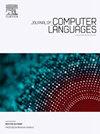Debugging in the Domain-Specific Modeling Languages for multi-agent systems
IF 1.8
3区 计算机科学
Q3 COMPUTER SCIENCE, SOFTWARE ENGINEERING
引用次数: 0
Abstract
In many cases, developers face challenges while implementing Multi-Agent Systems (MAS) due to the complexity of expanding software systems, despite the presence of numerous agent programming environments and platforms. To tackle this complexity, Model-driven Engineering (MDE) can be employed at a higher level of abstraction and component modeling before diving into MAS development, which helps alleviate the intricacies. Probably, the most effective method of incorporating MDE into Multi-Agent Systems (MAS) is to adapt Domain-Specific Modeling Languages (DSMLs) along with integrated development environments (IDEs). These tools make it easier to model the system and generate the necessary code for the development process. Although existing MAS DSML IDEs offer some control over systems modeled based on the language’s syntax and semantics, they lack built-in debugging support. This deficiency leads to uncertainty among agent developers about the accuracy of models prepared during the design phase. To address this issue, this study proposes a comprehensive debugging framework (MASDebugFW) that facilitates the design of agent components within modeling environments. The framework’s utilization commences with modeling MASs using a design language, and then converting these design model instances into a runtime model. Following that, the runtime model undergoes simulation using an integrated simulator specifically designed for debugging purposes. Additionally, the framework includes a simulation environment model and a control mechanism to manage the simulation process effectively. These features further enhance the debugging capabilities and overall functionality of MASDebugFW. Furthermore, we have qualitatively and quantitatively evaluated MASDebugFW, subjecting all obtained results to statistical analysis. The evaluation results show that, on average, the implemented framework reduces debugging time by around 45%, leading to more efficient debugging processes. Moreover, it significantly enhances bug detection and repair capabilities, as it increases the number of bugs fixed in the models by approximately 50%.
多智能体系统的领域特定建模语言调试
在许多情况下,尽管存在许多代理编程环境和平台,但由于扩展软件系统的复杂性,开发人员在实现多代理系统(MAS)时面临挑战。为了处理这种复杂性,在深入MAS开发之前,可以在更高层次的抽象和组件建模中使用模型驱动工程(MDE),这有助于减轻复杂性。可能,将MDE合并到多代理系统(Multi-Agent Systems, MAS)的最有效方法是将特定于领域的建模语言(Domain-Specific Modeling Languages, dsml)与集成开发环境(integrated development environments, ide)结合起来。这些工具使系统建模和为开发过程生成必要的代码变得更加容易。尽管现有的MAS DSML ide对基于该语言的语法和语义建模的系统提供了一些控制,但它们缺乏内置的调试支持。这一缺陷导致智能体开发人员对设计阶段准备的模型的准确性不确定。为了解决这个问题,本研究提出了一个全面的调试框架(MASDebugFW),它有助于在建模环境中设计代理组件。框架的使用从使用设计语言对MASs建模开始,然后将这些设计模型实例转换为运行时模型。然后,使用专门为调试目的而设计的集成模拟器对运行时模型进行仿真。此外,该框架还包括仿真环境模型和有效管理仿真过程的控制机制。这些特性进一步增强了MASDebugFW的调试能力和整体功能。此外,我们对MASDebugFW进行了定性和定量评估,并对所有获得的结果进行了统计分析。评估结果表明,平均而言,实现的框架减少了约45%的调试时间,从而提高了调试过程的效率。此外,它显著增强了错误检测和修复能力,因为它将模型中修复的错误数量增加了大约50%。
本文章由计算机程序翻译,如有差异,请以英文原文为准。
求助全文
约1分钟内获得全文
求助全文
来源期刊

Journal of Computer Languages
Computer Science-Computer Networks and Communications
CiteScore
5.00
自引率
13.60%
发文量
36
 求助内容:
求助内容: 应助结果提醒方式:
应助结果提醒方式:


